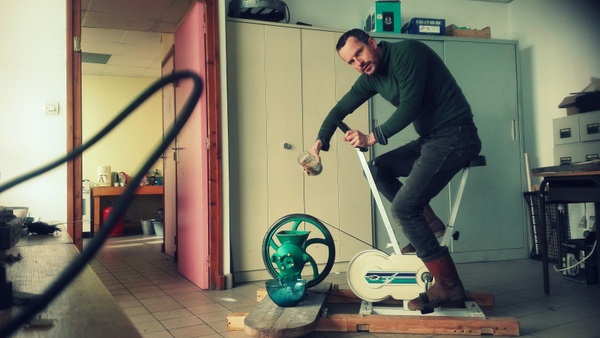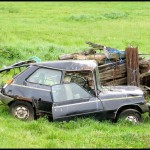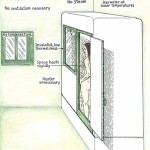- European car safety body is coming for touchscreens. [Politico] “The European New Car Assessment Programme mandates that key controls need physical buttons or switches.”
- A global survey of BikeBus initiatives. [ICTA-UAB] A Bike Bus is a group of children who ride their bike to school following a route with stops and timetables. Via Scope of Work.
- India’s electric rickshaws are leaving EVs in the dust. [Rest of World] “In the last decade, around 1.73 million three-wheeler EVs have been sold in India. Just last month, around 500 manufacturers — most of them homegrown — sold over 44,000 e-rickshaws, compared to less than 6,800 electric cars sold during the month.”
- Back on Track, an activist group for the return of night trains, is doing a crowdfunding to transform into a formal NGO.
No Tech Reader #46: Transportation
Fruit Trenches in Hungary
Image: Works on Badacsony (Badacsony 1952). [Read more…]
Repair Manual for Architects
Drawing the Line, Daniel A. Barber, Places Journal:
Like much else — everything else? — in the modern era, architecture has been shaped by fossil fuels, by the materials, forms, and environments made possible by the extraction and combustion of coal, oil, and gas. Many iconic buildings of the 20th century deployed copious quantities of concrete, steel, and glass, and found expressive ways to conceal their energy-intensive mechanical systems. Indeed, it would be difficult to come up with a more carbon-hungry type of construction. Yet now we know with ever-increasingly clarity that these formally compelling structures, with their carefully conditioned interiors, are contributing to the climate crisis that is suddenly, it seems, impossible to ignore. The science is clear, the changes are happening now, the transition is upon us.
Architects know all this; we know there are more responsible ways to design, and to build, and there is fervent collective aspiration to do better. Still, the field struggles to achieve even half-measures. The profession is reluctant to disrupt practices that have long driven and defined the design disciplines, practices that reward creation not maintenance, novelty not repair. Reluctant to cross the line that would mark a decisive shift from our carbon-profligate past to a future in which the environments we design have a wholly different metabolism, a different relationship to energy and the countless ways in which it shapes, even controls, our society and our politics…
Today we are compelled to recognize that the historical importance of architecture lies not just in its cultural dynamism but also in the energy systems it has depended on, deployed, and facilitated. To put it plainly: in the modern era, buildings have been a primary means through which fossil fuels, once extracted from the earth, have been processed and made social, and then entered the atmosphere in the form of carbon emissions. Buildings regulate throughput; metabolize forces. Buildings are in essence processors of energy, from construction to occupation to demolition to decay. One imagines that a history of 20th-century architecture, perhaps written in 2050, will emphasize this carbon-processing capacity as much as (or more than) the debates over modernity and postmodernity, or the indulgent thrills of parametricism. The buildings that exist, the buildings we are designing now: all perpetuate the fossil fuel economy. Architecture can be understood as the cultural frame — an apologist, even — for this processing of fuel…
Drawing the Line, Daniel A. Barber, Places Journal. This is the first article in the series Repair Manual. Thanks to Milo.
No Tech Reader #45: Housing
Structural issues: the cost of material and the value of labour. [The Architectural Review] “In an alternative future, taxes would protect human labour and punish excessive material use to stop wasteful practices.” (Thanks to David Bourgignon.)
How to Build an Iron Age Village. [YouTube] “In Argüeso (Cantabria) a group of young researchers and artisans recreated in 1999 a Cantabrian town from the Iron Age.” (Thanks to Adriana Parra.)
The Masons of Djenne. [YouTube/National Museum of Natural History, Smithsonian Inst.] “The film captures a unique and very old building technique using handmade masonry, perfected through multiple generations in Djenne, a small town in the West African country of Mali.”
Rammed Earth Construction: A Circular Solution For Sustainable Building. [Latin American Structural Engineering and Construction Conference 2024] “The low level of skill required for rammed earth buildings paves the way for self-built activities.”
Pedal-Powered Grain Mill
No Tech Reader #44: Tech & Politics
A Seamless Dystopia. [The Nation] “When I was younger, growing up in the rural but rapidly developing small town of my youth, I believed that cities were the place where one could find freedom. The greatest disappointment of my young adulthood has been the discovery that this is not true.” Via Arts&Letters Daily.
Surveilling Alone. [The New Atlantis] “Interpersonal surveillance technologies have rendered us far more visible to each other and given people a sense of security and safety when it comes to protecting their homes and loved ones. But they have not helped rebuild the one thing that human beings need to live together in peace: trust.”
After the Holocene. [Gene Ray] “Rightwing and leftwing “prepping” may share some practices and technics, but no equation between them is possible.”
Torching the Google car: Why the growing revolt against big tech just escalated. [Blood in the machine] “The original Luddites opposed “machinery hurtful to commonality,” not any and all new tech. Today’s self-driving car adversaries seem to be operating on a similar principle.”
The Goba of Ladakh: Current Relevance of a Traditional Governance System. [Vikalp sangam] Indigenous and other local traditional communities in India have had their own systems of local governance, which have informed people’s interaction with fellow community members as well as the rest of nature.







